Did you know?#1: How to filter reports based on different audience segments in PageSense

Hey everyone,
Over recent years, our customer support team has been getting queries asking I have this special requirement, and is it possible to achieve that with PageSense?" Fortunately, they were able to say "Yes" to most of them while providing an easy-to-implement way for a particular feature to be customized in PageSense to suit a user's specific business needs and demands. But we want these customization concepts to benefit more than just a few—we want them to benefit everyone.
That’s why we introduce you to a new learning series within our online community: Did you know. In this series, we'll share all those little, useful pieces of product features that you can customize extensively in PageSense to successfully achieve your website's goal. A few of these customization options may not be immediately obvious inside the tool but can really come in handy when you need them the most. So follow this page and post your comments about the information shared in the box below.
Here is our first post in the series: Filter your experiment's report based on audience segments
Your experiment reports are a powerful way to understand and visualize the performance metrics of your website. It is the place that shows whether you were able to get a substantial amount of new conversions, if your marketing efforts were effective, and if you generated the desired revenue at your business. However, a cumulative report that exposes data for all traffic on your website at one spot can leave you puzzled about which specific visitor group is performing well and which is not.
Also, this highlights the need to break down your experiment data into deeper and more relevant visitor parameters that you want to interpret. This can be achieved in PageSense by Creating customized report filters based on audience segments.
A custom filter report is a report that you create. You pick the audience segment conditions and key values to isolate the much-needed data in your reports dashboard. Zoho PageSense audience segmentation allows you to tailor your report data based on a varied set of audience parameters like the traffic source through which visitors land on your site, gender, age, device, location, purchase completion, or just about any detail you collected about the visitors on your website.
Filtering your reports based on the most specific audience criteria is the best way to identify the top/poor performing audience within each category so you can later plan future marketing campaigns potentially targeted at these audience segments.
Note: An audience segment is the group of visitors who share common characteristics and behavior on your website (for example, browser used, device used, geographic location, etc)
Let's understand this better with an example. Say you created a buyer's journey funnel for all visitors entering from your homepage and reaching the payment confirmation page of your ecommerce site. Now you want to drill down into your reports based on a few audience groups to focus on some really great data that can help in optimizing your website pages like:
Case 01: View all visitors who came from a particular ad campaign.
Say you've run different ad campaigns on your website and you want to view your funnel report for people coming from "Summer2021" ad campaign. In this case, you can create an audience segment and filter your report for visitors landing on your page from this specific campaign using the Query Parameter option as shown in the figure below.
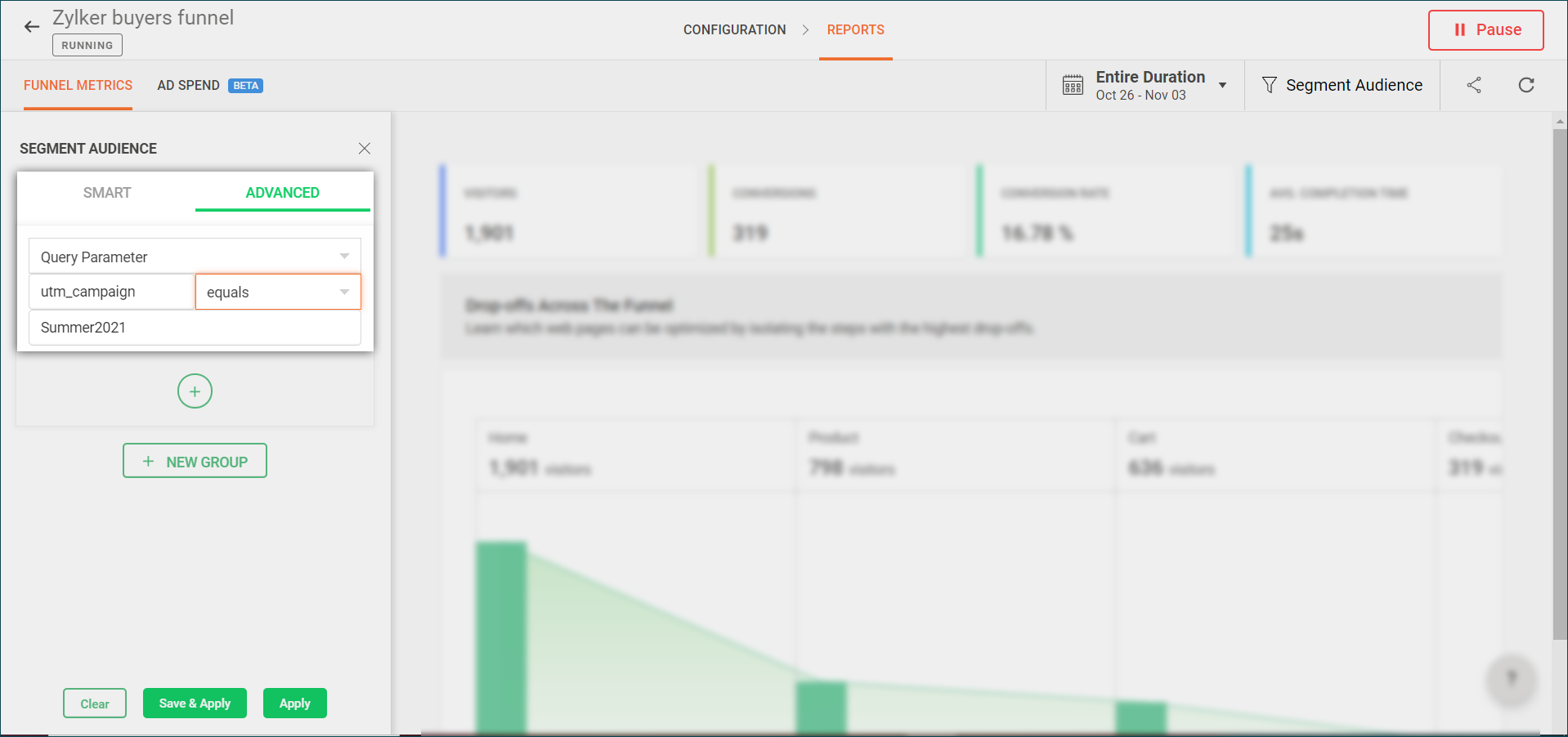
Filtering your report based on this criteria helps you learn how many visitors landed on your homepage through certain ads, as well as the drop-offs and conversions that occur in individual steps/paths for these visitor groups. Further, you can use this data to compare and analyze the effectiveness of individual campaigns that you run on Google, Instagram, and more on your buyer's funnel and identify opportunities to improve the ROI in your upcoming ads.
Case 02: Exclude visitors from a referral URL.
Say you've identified a referral site that sends a lot of spam traffic to your website. Now you want to filter out visitors who come from this referrer source in your funnel reports. In this case, you can create an advanced audience segment and filter your report for visitors who do not come from these URLs using the Referral URL option as shown in the figure below.
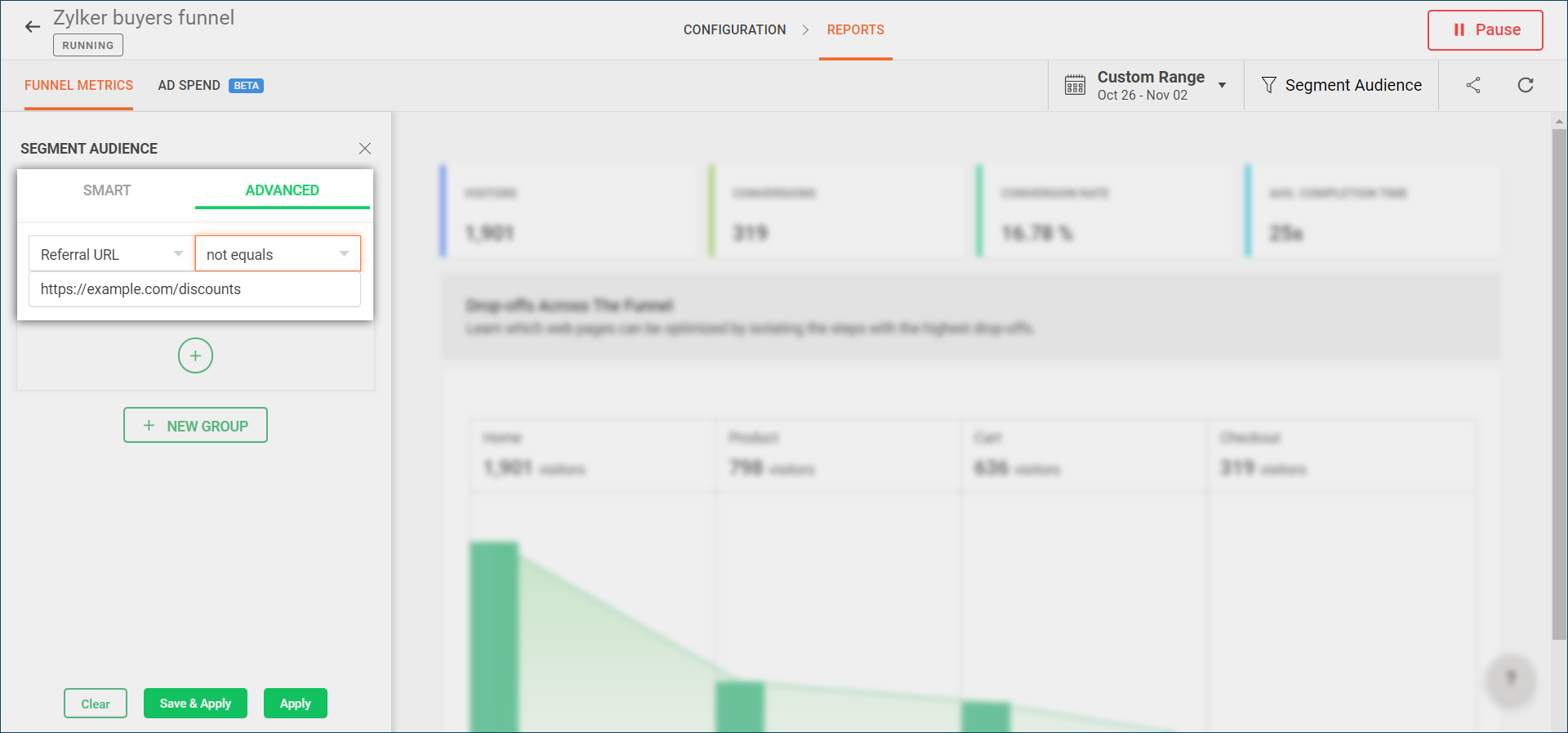
Filtering out your report based on this criteria helps you ignore visitors who either take part in your funnel analytics or generate any revenue of your site but still appear on your website, which isn’t valuable and can skew your funnel analytics.
Case 03: View all visitors who checked out items but failed to complete a transaction.
Say you want to clearly see the visitors who initiate a checkout process but fail to complete their purchases on your ecommerce site. In this case, you can filter your report using the Visitor Activity audience segment as shown in the figure below. Learn how to use the Visitor Activity segment while filtering your reports in PageSense.
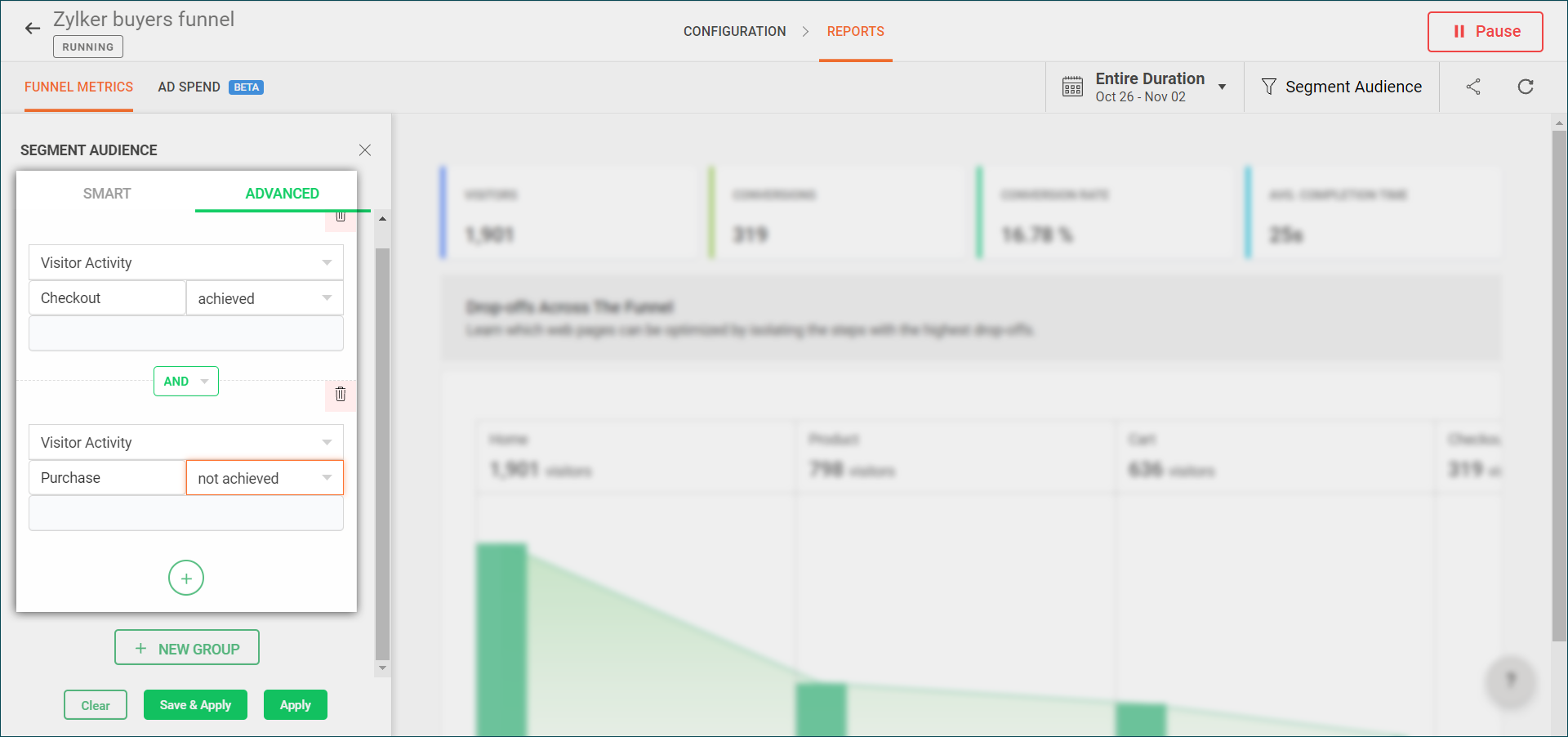
Filtering your reports based on this criteria can help you quickly identify visitors who did not convert beyond your checkout pages and the reasons why. For example, these could include website performance issues like poor CTA buttons and lengthy transaction forms, a lack of payment methods, or high shipping charges. This can later be used to plan new marketing strategies like providing extra discounts and coupon offers during checkout or offering faster delivery options.
Doesn't that look exciting? There are numerous filters like this that you can combine and create in PageSense based on your business' needs.
Try it out for yourself:
- From the REPORTS tab, select the Segment Audience button at the top-right corner and choose your preferred type of audience segment ("SMART" and "ADVANCED"). Check out the different types of audience filtering parameters available in PageSense.
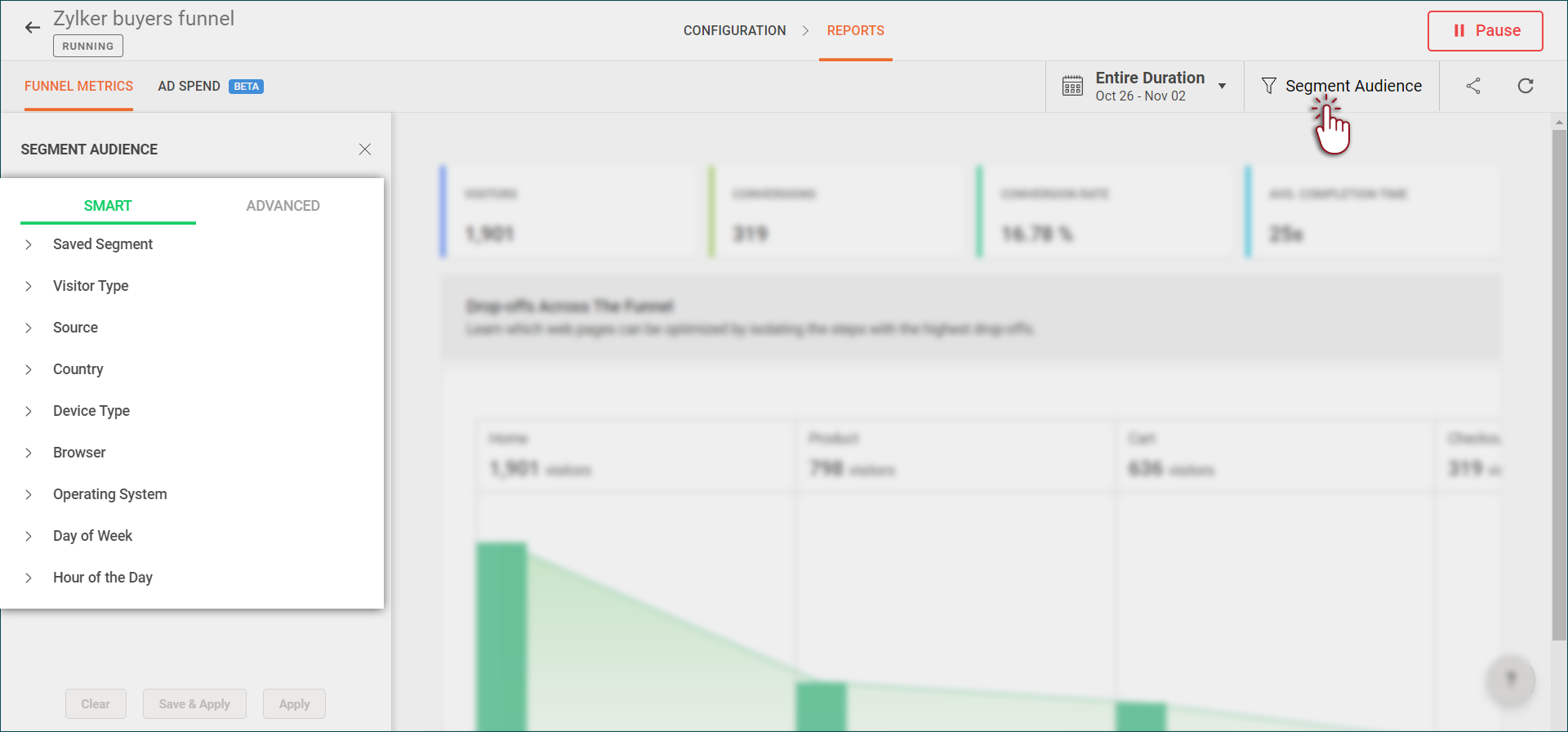
- Choose the audience parameters you want to filter from your report using the list. You can also create advanced audience segments using the AND/OR conditions.
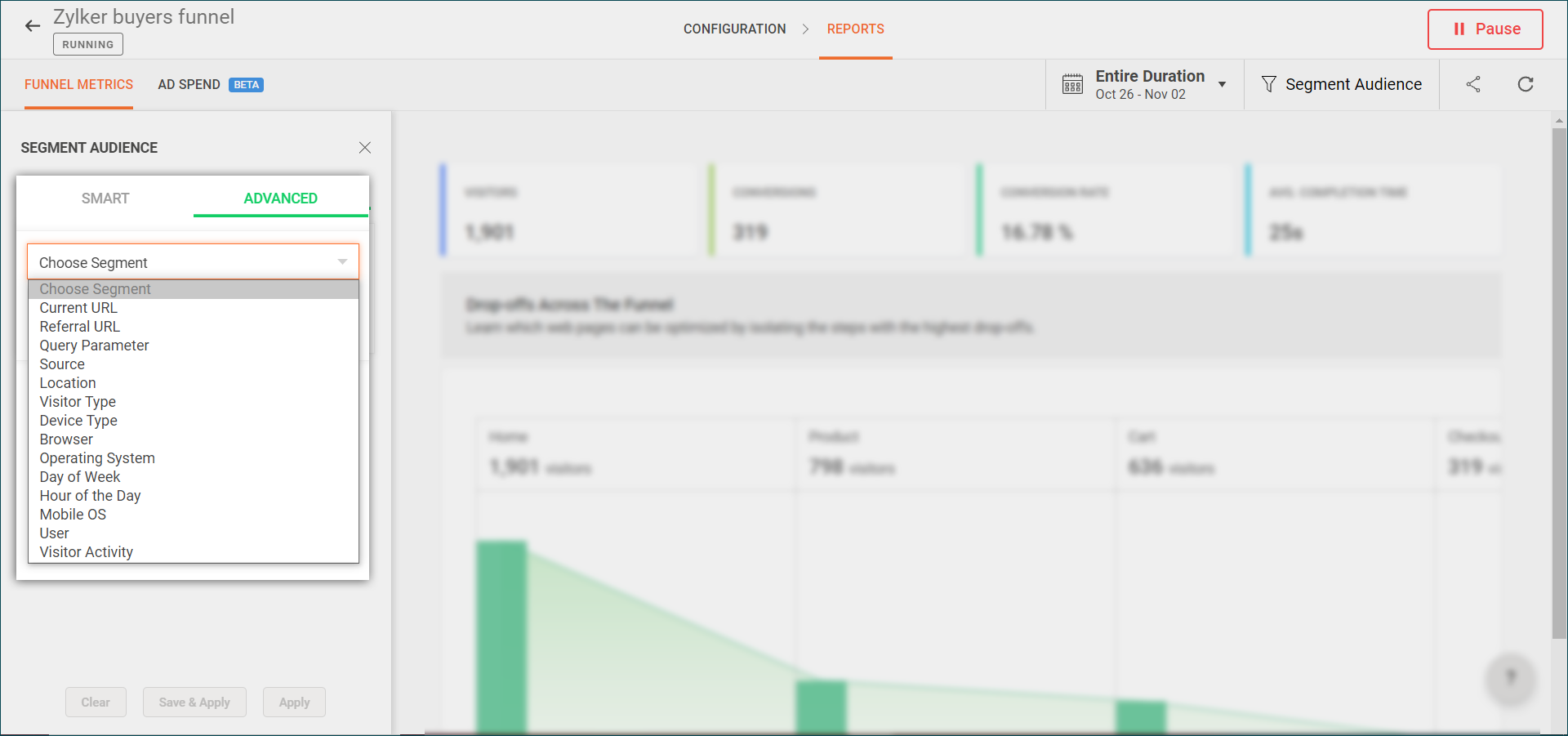
- Click Save & Apply and give your segment a name/description.
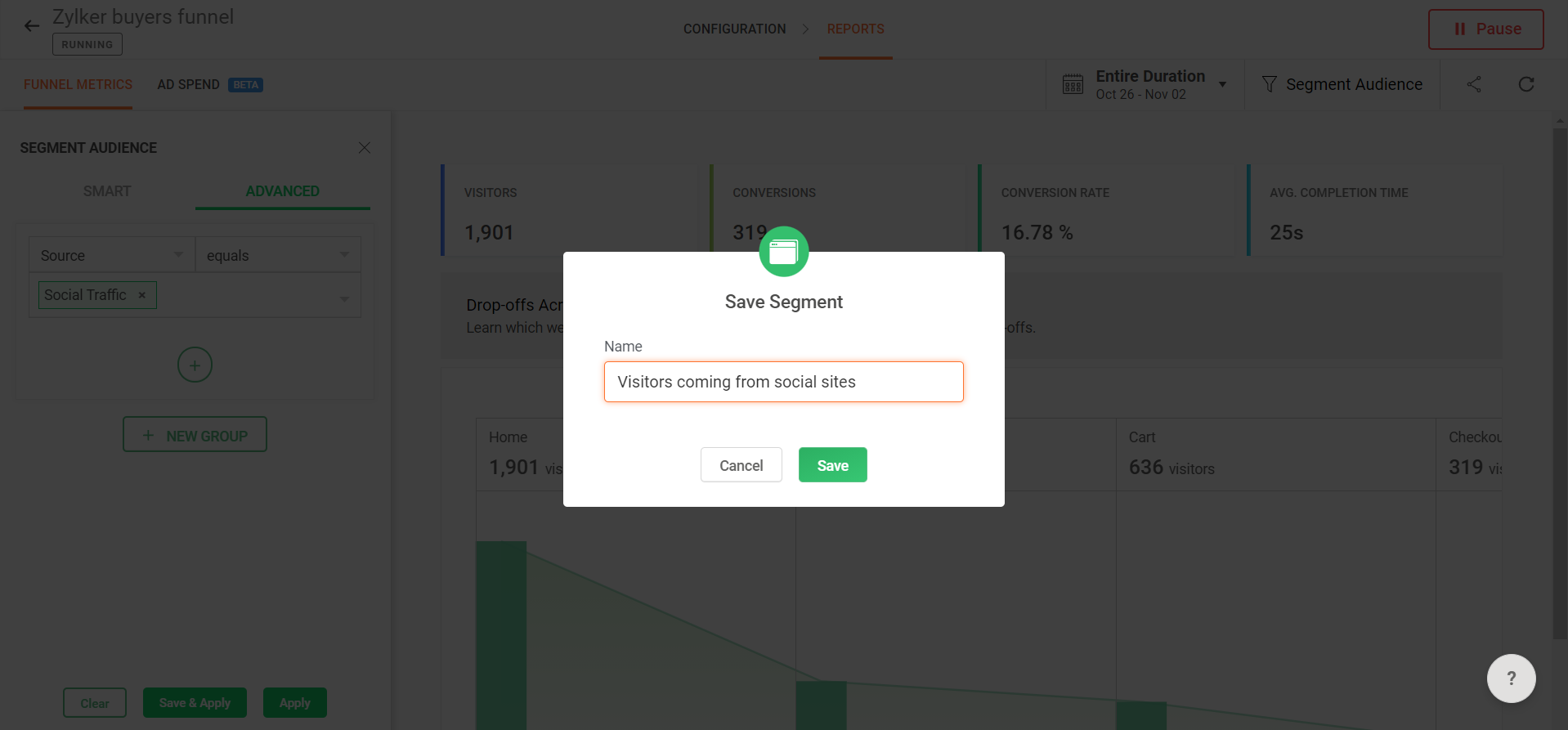
Your audience condition will be saved permanently and you can use it whenever you need to in just a couple of clicks. You also can edit your saved segments anytime by clicking the edit icon next to the audience segment.
Bonus Tips: When planning to use audience filters in reports, you could consider the following guidelines:
- Before starting to filter, determine if an audience segment you’ve created will be useful to extract the needed insight from your report. Creating the right combination of audiences is the most effective way to reach your potential customers.
- Keep your segments more widely defined. If your focus group is too thin, you could end up wasting time and energy in marketing and optimizing for smaller sets of audiences.
We hope that was useful. Please share your feedback or questions in the box below.
Is there a particular filter you want to save to your reports but you're unsure how to implement? Just write to us with your needs at support@zohopagesense.com, and we'll be happy to chat with you and provide the best solution for your situation.
P.S: Have you tried filtering your reports or have you discovered something interesting that you can do in PageSense? Let us know and we’ll share it to other community members in our next post.
Start customizing. Start growing!
Thank you.
Balarohini Paulraj
Centralize Knowledge. Transform Learning.
All-in-one knowledge management and training platform for your employees and customers.
New to Zoho Recruit?
Zoho Developer Community
New to Zoho LandingPage?
Zoho LandingPage Resources
New to Bigin?
Topic Participants
Balarohini Paulraj
Sticky Posts
[Live Webinar] How to maximize your conversions using existing website traffic
Hello all, Did you know that on an average only 0.1% of your traffic converts? The rest are either heading towards your competitors or dropping off without being able to find what they came for. When you want to increase your conversions, it's naturalA/B Testing Idea #2: Make your headlines sound super cool.
Hello everyone, We're back with our second post in the CRO testing idea series. If you missed the first post, please check it out here: "Place irresistible and clear CTAs." In today's post, we'll look at how to effectively A/B test your headline content.A/B Testing Idea #1: Place irresistible and clear CTA buttons
Are you wasting much of your time and effort A/B testing every single idea that pops into your head, yet you're not generating sufficient traffic to your website? Don't worry—we've got you. We'd like to introduce you to the A/B Testing Ideas learningDid you know?#3: How to target and run your experiment based on custom audience segments in PageSense
Whatever kind of online business you're running, defining your target audience is the key factor to delivering relevant messages and further positioning your brand in the industry. Most marketing efforts revolve around this basic strategy of segmentingDid you know?#2: How to filter your report by custom date range in PageSense
Do you want to quickly view your experiment analysis or responses over different time periods? Want to effortlessly compare the performance of your website by specific weeks, months, or years? Also, see whether your new marketing strategies or efforts
New to Zoho TeamInbox?
Zoho TeamInbox Resources
Zoho CRM Plus Resources
Zoho Books Resources
Zoho Subscriptions Resources
Zoho Projects Resources
Zoho Sprints Resources
Qntrl Resources
Zoho Creator Resources
Zoho CRM Resources
Zoho Show Resources
Get Started. Write Away!
Writer is a powerful online word processor, designed for collaborative work.
Zoho CRM コンテンツ
-
オンラインヘルプ
-
Webセミナー
-
機能活用動画
-
よくある質問
-
Ebook
-
-
Zoho Campaigns
- Zoho サービスのWebセミナー
その他のサービス コンテンツ
Nederlandse Hulpbronnen
ご検討中の方
Recent Topics
system not picking my default custom service report template
Can you tell me why when we create a service report always pick the (standard old) template? Even when I have a custom service report selected as Default.Restrict Appointment Booking to Approved Clients
Dear Zoho Bookings Support Team, We'd like to propose a feature enhancement for managing appointments within Zoho Bookings. This feature would ensure only pre-approved clients can schedule meetings. Desired Functionality: We propose the introduction ofAutomate Credit Card Surcharge
Is there a way to create an automation that will add a 3.0% credit card surcharge to a subscription whenever a customer pays via credit card?Product Request: Send email to Secondary email
Guys, we should be able to send the campaign to the secondary email too. Is this on the plans for Zoho Campaign? It looks like I can map the secondary email from the CRM to the Campaigs, but can not send the message.I have the item field and Quantity field in the sub form , on the submit of the form if the quantity is grater than inventory means show alert on submit validation only for item type goods ,
I have the item field and Quantity field in the sub form , on the submit of the form if the quantity is grater than inventory means show alert on submit validation . Stock Check Validation only for item type goods , not for item type service . For theCRM notes
I want to be able to add notes to a task that do not necessarily get rolled up into an account or contact. For example, I tasks to work on a Court Order for John Doe divorce account. There might be lots of updates (in the form of notes) that employeesDisappearance of all articles in the knowledge base
Hi there! It seems like all of our articles have disappeared from the knowledge base: However, the names still appear in the "sort articles" section:Logic for sending to a non-primary email address
Hi, I have a scenario where contacts are able to sign up for emails with 2 different email addresses (example: work, personal). I've mapped both to Campaigns from Zoho CRM, but when I go to target an email only the primary email addresses are pulling in. How can I update this to look at both of the email addresses - or specifically the secondary email address in Campaigns? Thanks, JennyApple Messages for Business in Omnichannel communications?
Hello, Apple launched "Apple Messages for Business" but Zoho CRM or Zoho Desk don't appear in the list of possible integrators. Zoho already promotes https://www.zoho.com/crm/omnichannel.html Omni Channel integration, but Apple Messages does not yet appear.Add "Reset MFA" Option for Zoho Creator Client Portal Users
Hello Zoho Creator Team, We hope you are doing well. We would like to request an important enhancement related to Multi-Factor Authentication (MFA) for client portal users in Zoho Creator. Currently, Creator allows us to enforce MFA for portal users,Tables for Europe Datacenter customers?
It's been over a year now for the launch of Zoho Tables - and still not available für EU DC customers. When will it be available?Does Zoho has chatroom/chatbot url feature?
Hi Zoho community! I’m looking for a quick "Yes/No" answer for my dev team regarding Zoho’s capabilities. We currently use Zoho Desk for our Service Team and Zoho CRM for our Marketing Team to bring both functions under one platform. Our question: DoesOne Support Email Managed By Multiple Departments
Hello, We use one support email (support@company.com). Incoming emails come to the "Support Department" and based on what the customer is asking, we route that ticket to different departments (billing, technical support, etc.). When users in these differentWhat's New in Zoho Analytics - February 2026
Hello Users! We're back with another round of updates for Zoho Analytics. This month's release focuses on giving you greater flexibility in how you visualize, manage, and act on your data - with new features like custom visualizations, remote MCP server,Is it Possible to Modify Standard Report Urls
Is there a way to permanently modify standard report Urls? Use case: Suppose I have a Products report. Showing list as timeline, calendar, or kanban doesn't make sense. Want to hide that from users by adding #Report:Products?zc_ShowAs=false&zc_Print=falseUpdated font library: New font styles and custom font options in Zoho Sheet
Zoho Sheet's font library now supports 500+ font styles in 60+ languages! The updated font library is stacked with new font styles, and some of the previously available font styles have been replaced with equivalent options. There are two ways you canscope for phonebridge in CRM and phonebridge API documentation
Hi I cannot find the scope to be used for phonebridge in CRM API V2 calls. I am getting OAUTH_SCOPE_MISMATCH for scope group ZohoCRM.modules.ALL,ZohoCRM.setttings.ALL Also I am not able to locate the documentation for the same, All I have is phonebridgeCreate custom rollup summary fields in Zoho CRM
Hello everyone, In Zoho CRM, rollup summary fields have been essential tools for summarizing data across related records and enabling users to gain quick insights without having to jump across modules. Previously, only predefined summary functions wereJob Alerts for Candidates
hi All, I have 2 questions relating to sharing job details with candidates. 1. is there a way to notify candidates that meet certain criteria of current jobs available? eg. I run a candidate search, and identify 50 candidates that might be suitable. CanZoho Wiki or new Zoho Learn
We are currently evaluating if we should move off confluence. At present in Confluence we have multiple levels within our documentation but with learn it looks like you can only have Space - Manual - Chapter Is it possible to have levels below Chapter? Also the same question for the existing wiki, can I have more sub-levels?Fix image at bottom of a page fot automatic proposal creation
I'm working on a proposal document to automate our proposal creation process. So far it works fine, but I experience some problems with an image I want to have fixed at the bottom of the page AND above the footer. This section of the document consistsCan't scroll the page down unless I refresh the page
Hello, This issue has been going on with me and a lot of other users in my organization, we can't scroll down! the scrolling side bar doesn't appear and scrolling down through mouse or keyboard keys doesn't work, it seems that the page just ends in thePrice List
II want to restrict the items to display in sales, quote, etc for which custom rates are added in price list. How I can do the same in Zoho booksLet’s Talk Recruit: Still switching tabs to source?
Welcome back to the Let’s Talk Recruit series. Let’s talk about how you actually source talent. Do you open multiple job boards every single time a role opens? Run the same keyword searches you ran yesterday? Download, upload, rename, and then do it againKaizen #231 - Embedding Zoho Desk Tickets in Zoho CRM
Hello, CRM Wizards! This week, let us enhance cross-team visibility between Zoho CRM and Zoho Desk. We will use the Zoho Request Client inside a Related List widget to display open Zoho Desk tickets directly within the Contact record in Zoho CRM. ThisEU Problem
Hi all, we've been facing issues with the Europe data center for two days. It's starting to disrupt our daily workflow. Any word on when this will be resolved?Introducing a smarter, faster, and more flexible charting experience
Hello Zoho Sheet users, We're delighted to share the latest news about a major update to charts in Zoho Sheet! The new version supports dynamic data ranges, granular styling options, faster loading, and other interesting enhancements that allow you toIntroducing Job Alerts
Keeping candidates engaged beyond their first application is one of the most consistent hiring challenges. Many interested candidates simply do not revisit career sites regularly, which can result in missed opportunities and reduced re-applications. ToWhere is the settings option in zoho writer?
hi, my zoho writer on windows has menu fonts too large. where do i find the settings to change this option? my screen resolution is correct and other apps/softwares in windows have no issues. regardsClient Script | Update - Client Script Support For Custom Buttons
Hello everyone! We are excited to announce one of the most requested features - Client Script support for Custom Buttons. This enhancement lets you run custom logic on button actions, giving you greater flexibility and control over your user interactions.Enhance Sign CRM integration
Hello all, I'm working on a custom Deluge script to enhance the integration between Zoho CRM and Sign by using a writer merge template for additional flexibility. I want to replicate the post-sign document integration that exists between CRM and SignTask status - completed - other options
I have a dumb question I know i can make custom statuses for the tasks - but is there anyway to make additional "completed" statuses like for instance if i have a task "call back customer" and i leave a vm for them to call back marking it "completed -Bank feed integration First Abu Dhabi Bank (FAB) to Zoho? (UAE)
Hello everyone, Is First Abu Dhabi Bank in the list of banks available for bank feed integration with Zoho Books? Thank you.How to Export Filtered List of Contacts?
This seems like it should be simple, but I'm stymied. I'm trying to export a filtered list of my Contacts for analysis in a spreadsheet. The use case is that I'm an ecom business based in the US. The bulk of our customers are individuals stored as Contacts.Possible to Turn Off Automatic Notifications for Approvals?
Hello, This is another question regarding the approval process. First a bit of background: Each of our accounts is assigned a rank based on potential sales. In Zoho, the account rank field is a drop-down with the 5 rank levels and is located on the accountQuick Create needs Client Script support
As per the title. We need client scripts to apply at a Quick Create level. We enforce logic on the form to ensure data quality, automate field values, etc. However, all this is lost when a user attempts a "Quick Create". It is disappointing because, fromcan we add product images in Zoho CRM Quote PDF template?
I want to create a quotation format in Zoho CRM similar to the attached PDF, where each product is displayed in a table with rpoduct image I need the product image to appear inside the line items section of the quote. However, while checking the QuoteDoes Zoho Writer have Dropdowns
I want to add a drop down field in Zoho writer. Is this possible?Facturation électronique 2026 - obligation dès le 1er septembre 2026
Bonjour, Je me permets de réagir à divers posts publiés ici et là concernant le projet de E-Invoicing, dans le cadre de la facturation électronique prévue très prochainement. Dans le cadre du passage à la facturation électronique pour les entreprises,Connecting Multiple WooCommerce Stores to a Single Zoho Marketing Automation Account
Is it possible to connect multiple WooCommerce stores to a single Zoho Marketing Automation account?Next Page












